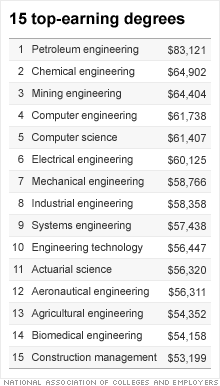Most lucrative college degrees
Hint: Grab a pencil, calculator, protractor ... or a drill. Engineering majors snag most of the top spots.

NEW YORK (CNNMoney.com) -- Math majors don't always get much respect on college campuses, but fat post-grad wallets should be enough to give them a boost.
The top 15 highest-earning college degrees all have one thing in common -- math skills. That's according to a recent survey from the National Association of Colleges and Employers, which tracks college graduates' job offers.
"Math is at the crux of who gets paid," said Ed Koc, director of research at NACE. "If you have those skills, you are an extremely valuable asset. We don't generate enough people like that in this country."
This year Rochester Institute of Technology hosted recruiters from defense-industry firms like Lockheed Martin (LMT, Fortune 500) and Northrop Grumman (NOC, Fortune 500), as well as other big companies like Microsoft (MSFT, Fortune 500) and Johnson & Johnson (JNJ, Fortune 500).
"The tech fields are what's driving salaries and offers, and the top students are faring quite well," said Emanuel Contomanolis, who runs RIT's career center.
Specifically, engineering diplomas account for 12 of the 15 the top-paying majors. NACE collects its data by surveying 200 college career centers.
Energy is the key. Petroleum engineering was by far highest-paying degree, with an average starting offer of $83,121, thanks to that resource's growing scarcity. Graduates with these degrees generally find work locating oil and gas reservoirs, or in developing ways to bring those resources to the Earth's surface.
"Exploration for new energy sources is high," Koc said. "The oil and gas industry has done relatively well the past year, even though oil prices are off right now."
Other highly-paid engineering majors include chemical engineers, who employ their skills to make everything from plastics to fuel cells and have an average starting offer of $64,902.
Mining engineers start at $64,404 on average, while computer engineers, who have an expertise in both coding and electrical engineering, pocket roughly $61,738 their first year out of school.
Left behind. Of course, not every student with an engineering degree will score a fat paycheck. RIT's Contomanolis noted that "average" graduates are feeling the pinch of fewer job offers. Still, in a tough job market, graduates with technology degrees have an advantage.
"It's a tech-driven world, and demand [for engineers] is only going to grow," said Farnoosh Torabi, employment expert and Quicken blog editor. "You can't say that about many fields, especially in a recession."
Perhaps that's why more and more college students are picking their majors based on a field's earning power, ultimately "choosing a major that pays," Torabi said.
Top non-engineering fields. Only three of the 15 top paying degrees were outside the field of engineering -- but they each still require math skills.
For computer science majors, who specialize in programming and software, the average salary was $61,407. Graduates with degrees in actuarial science took home about $56,320; and jobs for students in construction management paid about $53,199. Each of these fields has paid well throughout the years, Koc said.
What happened to well-rounded? There are far fewer people graduating with math-based majors, compared to their liberal-arts counterparts, which is why they are paid at such a premium. The fields of engineering and computer science each make up about 4% of all college graduates, while social science and history each comprise 16%, Koc noted.
As a result, salaries for graduates who studied fields like social work command tiny paychecks, somewhere in the vicinity of $29,000. English, foreign language and communications majors make about $35,000, Koc said.
"It's a supply and demand issue," he added. "So few grads offer math skills, and those who can are rewarded." ![]()




